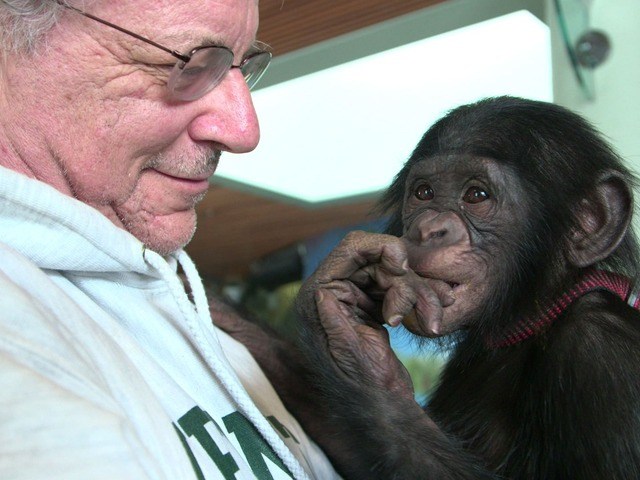Voiceless recently interviewed Professor Steven Wise, founder of the ground-breaking Nonhuman Rights Project in the USA. We spoke to Professor Wise about the Project’s aims, challenges and successes to date.
What is the Nonhuman Rights Project, and why did you decide to create it?
The Nonhuman Rights Project is a civil rights organisation whose mission is to gain legal rights for nonhuman animals. I started it because nonhuman animals have long been legal things who lack the capacity for any legal rights. I had been working as an animal protection lawyer for years but wasn’t really getting anywhere significant. I realised that this problem of nonhuman animals being things was the real issue, and that I would never be able to protect even the most fundamental interests of any nonhuman animal because they were things. So I began the Nonhuman Rights Project in order to litigate cases in which we could attempt to establish legal rights and legal personhood for nonhuman animals.
In your opinion, how has the law failed nonhuman animals and entrenched their suffering?
By making nonhuman animals legal things, we have entrenched their suffering. When you are a thing, you are invisible to civil law, you are not seen as having inherent value. Your only value as far as the law is concerned is instrumental value to persons which are human beings. You don’t have any rights.
What are you trying to achieve through your current litigation in the US?
The first thing we are trying to do is persuade judges that at least some nonhuman animals can have the capacity for rights. Because right now at least in the US no nonhuman animals are seen as legal persons who have the capacity for rights.
What are the rights that you are proposing should be protected?
You have to view personhood as kind of an empty vessel. It’s simply a capacity, and once that capacity is established you can begin to determine which rights ought to go into that personhood vessel. We are beginning with seeking a single right, the fundamental right to bodily liberty.
A person is simply a rights container. We are trying to establish that nonhuman animals such as chimpanzees, elephants and orcas are persons, that is rights containers. There’s an infinite number of possible legal rights. We are working to establish which rights each species of nonhuman animals should have, case by case.

In our early cases we are arguing that the rights container should hold the right to bodily liberty. Once judges begin to agree that a chimpanzee for example should have the right to bodily liberty the next case may be about bodily integrity. We intend to argue right by right, species by species, as we litigate which rights are appropriate for each species. Thus chimpanzees should have chimpanzee rights, not human rights or elephant rights.
Have any judges been persuaded by your arguments?
This year (2018), the first US high court judge to give an opinion on the merits of our arguments, Eugene Fahey of the New York Court of Appeals, issued what we think is going to be seen as a turning point in the struggle to obtain the rights of nonhuman animals. Judge Fahey said that imprisoning a chimpanzee was a “manifest injustice.” He said that a chimpanzee is not a thing, and is arguably a person. He said that the High Court of New York cannot continue to refuse to rule on these kinds of cases because there were very important issues at stake here. And he said that the lower court judges in New York who had ruled against us had been wrong.
Do you expect to see change occur in your lifetime?
I expect to see change occur in the next year! It’s happening rapidly. Judges are beginning to understand what we, and others like us, are doing.

India, Columbia, Argentina and New Zealand are all beginning to give legal rights and personhood to nonhuman animals themselves or to natural entities, such as the Amazon rainforest or a river or national park. The world is changing rapidly and judges in the US and elsewhere are going to have to change with it.
What is your proudest moment to date?
My proudest moment was when we went into court and I stood up for the first time after preparing for 28 years and argued that a nonhuman animal should not be a thing but should be a person.
The NhRP is bringing habeas corpus lawsuits on behalf of nonhuman plaintiffs held in captivity across the US. Habeas corpus is a type of legal remedy which can be used to bring prisoners before a court to make a ruling on whether they have been imprisoned in accordance with the law.
The NhRP lawyers are using this ancient common law writ to argue that nonhuman animals (such as chimpanzees) should be released from captivity into sanctuaries. To do this, they must first establish that their clients are legal persons, rather than legal ‘things’.
Although these arguments are unprecedented in the US legal system, recently a judge in Argentina ruled that a chimpanzee called Cecilia living in a zoo is a ‘non-human legal person’ with ‘inherent rights’.
Learn more about the NhRP and Professor Steven Wise’s work in our Legal Personhood APE.
Voiceless Blog Terms and Conditions: The opinions expressed on the Voiceless Blog are those of the relevant contributors and may not necessarily represent the views of Voiceless. Reliance upon any content, opinion, representation or statement contained in the article is at the sole risk of the reader. Voiceless Blog articles are protected by copyright and no part should be reproduced in any form without the prior consent of Voiceless.

